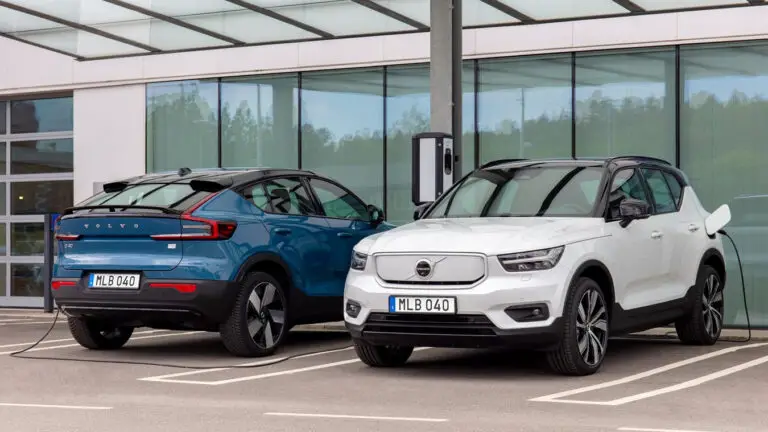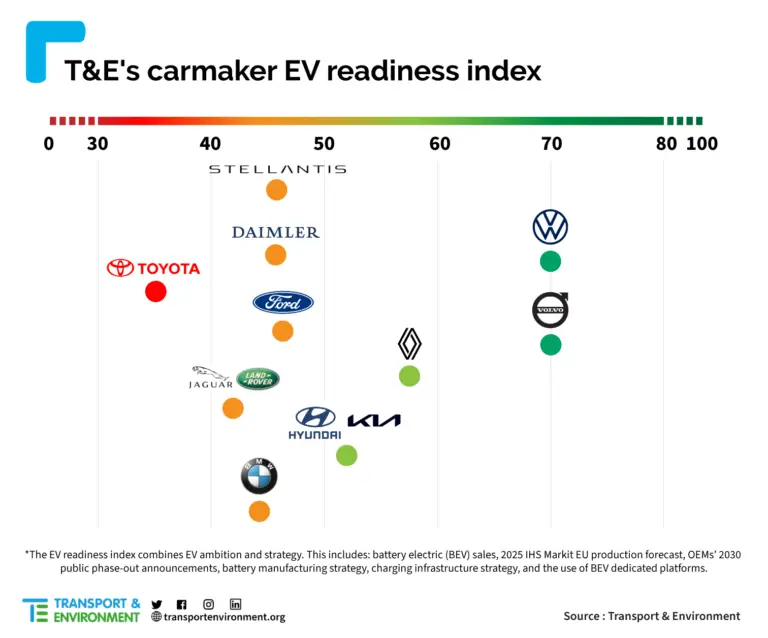Volvo and Volkswagen are the only top car producers on target to switch to electric vehicle production in Europe by 2030 according to an EV readiness index by Transport & Environment.

By mid-2021, Volvo Cars and Volkswagen are the only major carmakers ready to switch to electric in line with Europe’s net-zero climate target, according to a new analysis by Transport & Environment (T&E), a European clean transportation campaign group. Renault and Hyundai-Kia are also making progress. Stellantis, Daimler, Ford, Jaguar, and BMW are lagging in concrete plans for battery-electric vehicles with BMW, Mercedes-Benz, and Toyota relying heavily on hybrid technology, which in practice probably continue to pollute far more than manufacturers achieve in the official tests.
Europe: EV Production Readiness Index of Top Car Manufacturers
A ranking of the readiness of 10 major European car manufacturing groups by T&E for the transition to electric vehicles in Europe by 2030 shows there are big differences in ambition and quality of their plans. Volkswagen and Volvo have aggressive and credible strategies. Others like Ford have an ambitious phase-out target but lack a robust plan to get there. Stellantis, Daimler, BMW, Jaguar Land Rover, and Toyota rank the worst with low short-term battery electric (BEV) sales, no ambitious phase-out targets, no clear industrial strategy, and an over-reliance in the case of BMW, Daimler, and Toyota on hybrids.
T&E produced the following electric vehicle production readiness index for the top ten car makers in Europe:

According to Julia Poliscanova, senior director for vehicles and emobility, “Carmakers are desperate to show off their green credentials, but the reality is most of them are miles away from where they need to be. Even those that are ambitious lack a suitable strategy to get there. Carmakers have failed to deliver on their promises before, who says this time will be different?”
Electric Car Production and Targets in Europe
T&E’s EV readiness index considered carmakers’ current and short-term EV sales, as well as their wider industrial strategies such as battery supply chain, charging infrastructure, and dedicated BEV platforms. A few further interesting statistics from the report also reveals:
- BEV production in the EU27 is expected to increase from around 1 million units in 2021 (7.4% of production), to 3.3 million units in 2025 (24.2%) and surpass sales of cars with an internal combustion engine (ICE) in 2030 with 6.7 million (50.2%).
- Carmakers’ production plans show that plug-in hybrid vehicles (PHEVs) are expected to peak at 1.6 million units in 2026 (12% of total car production) and then stagnate throughout the second half of the decade.
- Ford has an ambitious commitment to become fully electric by 2030. But it appears to be running out of time. It is expected to produce just 13% BEVs by 2025.
- Toyota has not set a target for 2030 and it plans to produce just 10% BEVs in 2025. It is expected to rely on polluting hybrid technologies (44% of its EU production in 2030).
The report raises concerns over the reliance on carmakers’ voluntary commitments, which are too low and not backed up by a coherent industrial strategy. Previous analysis by T&E showed that in 2016, carmakers failed on their collective target of selling 3.6% electric cars, achieving less than half of that.
But even if the current promises are met, Europe’s sales of battery electric vehicles (BEVs) are likely to be at least 10 percentage points lower than they need to be in 2030. To ensure carmakers ramp up the production of affordable electric cars in time to decarbonize by mid-century, European regulators need to set binding car CO2 targets in the next decade leading to two-thirds of new cars being fully electric by 2030 and all new cars in 2035, says T&E.
Julia Poliscanova concluded: “There is no longer any doubt that a fossil-fuel-free, all-electric future is possible. But with only two carmakers close to where Europe needs to go, policymakers can’t leave it to carmakers to get there on their own. Targets need to be gradually tightened so that carmakers not only commit to phasing out fossil fuels but develop a strategy that gets them there on time.”
T&E Recommendations for Battery Electric Vehicle Production in Europe
T&E previously suggested that the production of electric vehicles in Europe will be cheaper than regular combustion engine cars from 2026. However, given the previous behavior of carmakers with voluntary commitments, T&E suggested the following policy measures:
- A higher 2025 standard of -25% and an additional target of at least -40% in 2027 are needed to make electric cars affordable, and the EU car industry globally competitive.
- A 2030 target of at least -65%, followed by a complete phase-out of combustion engine vehicles in 2035.
- No multipliers or credits for current PHEV models, whose CO2 values should be adjusted based on their real-world emissions.
- No fuels credits and tightening of existing regulatory loopholes such as mass adjustment.
Car Sales Statistics for Europe in 2021
→ Latest European Car Sales Statistics
- Car Sales and Market Analysis: January, February, March, April, May, June, July, August, September, October, November, December, Full Year 2021
- Top-Selling Car Models: Top 25 Models 2021, Top 15 Electric Models
- Sales per European Country: Q1, Half Year, Q3, Full Year
- Sales by Brand: Q1, Half Year, Q3, Full Year
- Electric and PHEV Sales by Country: Q1, Half Year, Q3, Full Year, Top Electric Brands and Models
